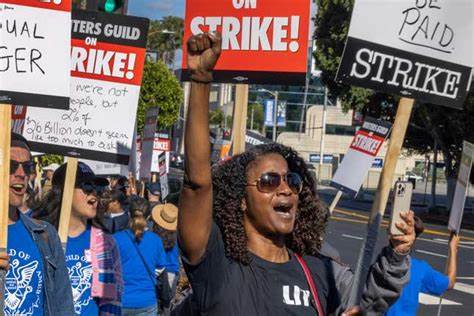By Jessica Washington | The Root
The early 2000s are back! And we’re not talking about chocker necklaces. Hollywood writers are back on strike demanding fair pay and better working conditions. The strike began on Tuesday after contract negotiations failed, effectively calling lights out on major films and television productions nationwide.
The strike didn’t come out of nowhere. For years, screenwriters have complained that the pivot to streaming made by television and film executives decimated pay for writers and had disastrous impacts on working conditions. Several notable Black celebrities and writers have spoken out to support the strike, including Quinta Brunson, Yvette Nicole Brown, Ashley Nicole Black, and Sherri Shepherd, who spoke to The Root about her support.
While many of the writers’ demands are race-neutral on their face, that clearly hasn’t stopped Black writers and celebrities from throwing their support behind the strike. The Root decided to visit to the picket lines to see why Black writers are pushing pause and what they hope to achieve once the dust clears.
“No Netflix, No Chill. It’s Time To Pay Your Bills!”
Dark clouds hung over the dozens of WGA writers and their supporters lining the sidewalk outside of Netflix’s Manhattan office. Chants of “no Netflix, no chill, it’s time to pay your bills” echoed throughout the crowd as cars blared their horns in support.
“We’re doing this for everybody,” says Tocarra Mallare, a writer for The Problem with John Stewart.
Although she’s only been in the industry for a couple of years, Mallare says she can see the way streaming and technology have impacted the industry. “Writing used to be a way for people in the creative field to lead a middle-class life; it’s turning into a gig economy,” she says.
Jameel Saleem, 41, says the fact that writers who work on popular shows are paid significantly less just because they’re working on streaming shows versus network shows is ridiculous.
“I worked on a Netflix show, it was a short run, we were paid below scale, and the show ended up not going anywhere, and then I wrote on another Netflix show, same thing, below scale, residuals very low, and now I work on a network show, and I see the disparities,” says Saleem, co-executive producer of the hit Fox comedy Bob’s Burgers. “It’s ridiculous.”
Saleem says he’s inspired by the number of people out there supporting fair wages, even if they’re not the ones directly suffering. “I’m an upper-level writer,” says Saleem. “I’m here for the lower-level writers that are working on major shows and still struggling to pay their rent.”
The rampant usage of “mini-rooms,” small writers’ rooms often used to develop a series, is another problem for Black writers who tend to have fewer connections. “With these short seasons and ‘mini-rooms,’ it’s harder for those people moving to LA with a dream to get in there because a lot of the slots are going to nepotism hires,” Saleem says.
Limiting “mini-rooms” are a crucial part of the union’s demands.
Are Black Writers Getting Paid Enough to Write Black Stories?
Ekwa Msangi, a feature film writer in her 40s, says that in the wake of George Floyd’s death, the industry started to green-light more projects about people of color, but that didn’t equate to fair wages.
“There’s so many more films and shows that feature Black, brown, indigenous, women, LGBTQIA+ people, and I think people have made the right steps in hiring us,” says Msjangi. “But then they’re not paying us what we deserve and what we can actually live on.”
Black Writers Talk Supporting Their Families
A common theme among the Black writers we spoke to was that many Black screenwriters support their families back home with salaries that are barely enough for themselves. “For Black writers, your dollar has to stretch a lot more,” says Randall Otis, a writer on The Daily Show. “Because the net worth of your family, your immediate family, your extended family, a lot of the money you make personally goes to support a lot more people… getting a fair wage is even more critical when that dollar has to stretch that much further.”
Mallare shared similar sentiments: “A lot of Black people, we’re not just supporting ourselves. We’re supporting our family as well.”
What Do The Networks Have to Say About The Strike?
It probably won’t shock you to learn that the major networks and streaming services like Netflix have a different view of the writers’ strike. In a statement to The Root, the Alliance of Motion Picture and Television Producers claimed that they’d offered a generous package in the negotiations to the WGA and were willing to improve the offer if the union dropped some of their “sticking points.”
“The AMPTP member companies remain united in their desire to reach a deal that is mutually beneficial to writers and the health and longevity of the industry, and to avoid hardship to the thousands of employees who depend upon the industry for their livelihoods,” wrote the Alliance of Motion Picture and Television Producers, in a statement.
Why The New Contract Needs to Fit The Times
Otis sees the strike very differently. “It seems like a very simple classic tale of business owner versus the worker and them trying to hold a disproportionate, unfair share of the profits,” he said.
For context, Reed Hastings, the CEO of Netflix, where the protest was being held, will reportedly earn a $650,000 salary this year on top of a whopping $34 million in stock options, according to reporting from Variety.
“Basically, we’re getting unfair contracts from these production houses, and the only way you can really express your voice and negotiate,” says Otis, “is by banding together with the other writers and withholding our labor.”
To Saleem, it’s obvious that the contract this time around needs to reflect the very different landscape of media ushered in by the people in positions of power.







